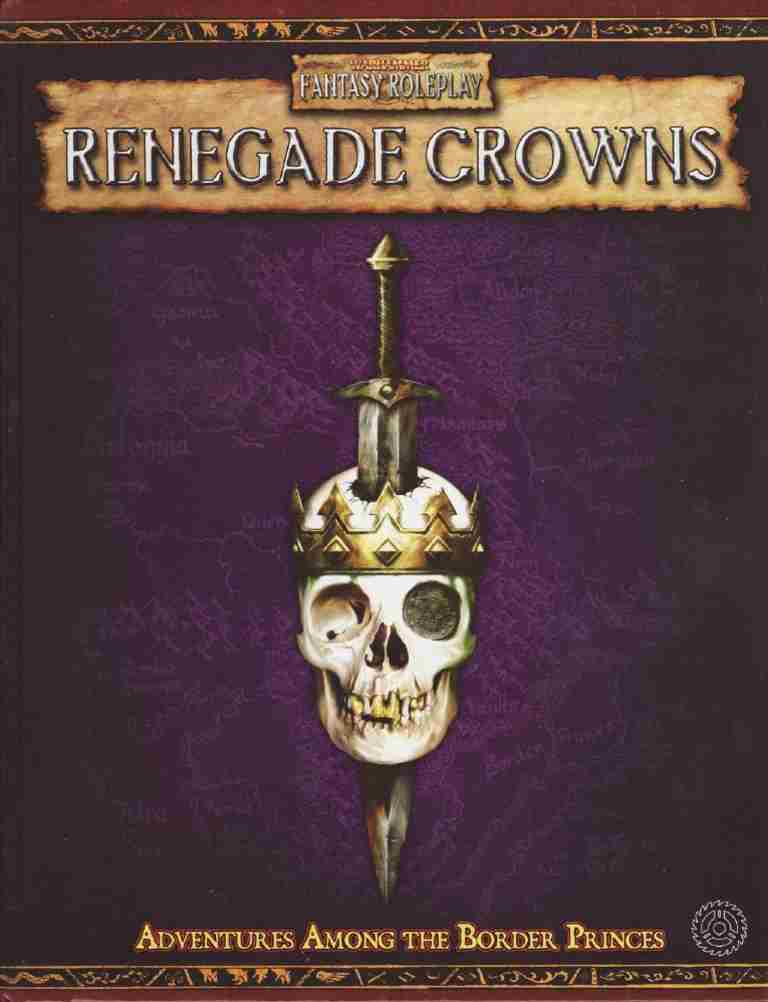Which RPG provides the most useful resources?
I’m thinking about this in terms of resources for world-building, character design and enhancing the play experience.
The first edition of Warhammer Fantasy Roleplay had some great information about settlements. World-building thirty years ago was definitely much more geographically grounded, and WFRP added a socio-economic layer that started to make me think harder about populating the world, rather than just filling it with random monsters and rewards.
Black Industries’ library of second edition supplements (re-issued recently by Cubicle 7) were packed with some excellent reference material, not just for Warhammer’s Old World setting. For example, Renegade Crowns is a complete manual for designing fantasy outlaw and badlands settings. Based in the Border Princes region, a fluid and unstable part of the otherwise steeped-in-lore Old World, it was really a toolkit for generating your own politically charged frontier sandbox.
Probably the resource I have used most is Liber Fanatica, a multi-volume compilation of fan-made contributions for WFRP. As well as the expanded character module (with rich background tables replete with excellent hooks and campaign seeds), there is superb reference material for inns, treasure, monsters, organisations, and a whole host of other elements you might want to include in your game. Any medieval fantasy setting will benefit from the suite. The Games Masters Guide even provided advice on alternative means of play: at conventions, by email, through online chat and on message board – unusual and prescient for its time.
 Dynamic or in-game world-building is much more where it’s at these days though. I like how some small-press games provide generative world-building methods. You can quickly and coherently create nihilistic conspiracy settings with Matt Machell’s Covenant, for example, or an entire planetary colony with Jason Morningstar’s Durance.
Dynamic or in-game world-building is much more where it’s at these days though. I like how some small-press games provide generative world-building methods. You can quickly and coherently create nihilistic conspiracy settings with Matt Machell’s Covenant, for example, or an entire planetary colony with Jason Morningstar’s Durance.
I’m increasingly seeing these kinds of subsystems and game methods as reusable resources. I seem to remember Primetime Adventures had good mechanisms to structure campaigns (or series) with ensemble casts. I’ve not played Smallville, but Ewen Cluney’s  Entanglements is a neat story mapping resource derived from its Pathways creation system.
Entanglements is a neat story mapping resource derived from its Pathways creation system.
I should also mention Unknown Armies. The recent third edition emphasises a collaborative world-building process (it’s where it’s at these days). That’s not the resource I’m interested in for this post. Apart from anything, I’ve not seen or heard of anybody use it as-written, and I’m certainly wrestling with it too much in my current campaign to recommend it at this point.
But earlier versions of the game were a great asset for GMs, packed with good game-running and campaign-designing advice. It feels ahead of its time for being not only character-driven and narrative-focussed, but also being ‘self-aware’: an intentionally designed game system, for intentional and conscientious players. The latest version continues in this vein. Book 2: Run contains some solid advice about the antagonist phase – the gaps between playing sessions – and how a GM can make the most of it.




